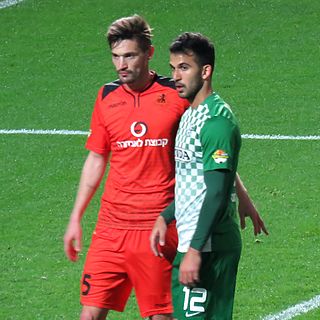Related Research Articles

Mira Furlan was a Croatian-American actress and singer. Internationally, she was best known for her roles as the Minbari Ambassador Delenn in the science fiction television series Babylon 5 (1993–1998), and as Danielle Rousseau in Lost (2004–2010), and also appeared in multiple award-winning films such as When Father Was Away on Business (1985) and The Abandoned (2010).

Croatia competed at the 2004 Summer Olympics in Athens, Greece, from 13 to 29 August 2004. This was the nation's fourth consecutive appearance at the Summer Olympics since the post-Yugoslav era. The Croatian Olympic Committee sent the nation's smallest delegation to the Games since its debut in 1992. A total of 81 athletes, 66 men and 15 women, competed in 14 sports. Men's water polo, and men's handball were the only team-based sports in which Croatia had its representation in these Olympic Games.

Zlatko "Cico" Kranjčar was a Croatian professional football manager and player.
The following are the association football events of the year 2012 throughout the world.
Dubravko Pavličić was a Croatian footballer who played as a central defender.

Vinko Begović is a Croatian football manager and former player.
Dubravko Detoni is a composer, pianist and writer. Although active since the early 1970s he is almost unknown internationally.
Dubravko Šimenc is a former Croatian water polo player who competed for both Yugoslavia and Croatia, and later water polo coach.
Dubravko Škiljan, was a Croatian linguist known for his work on Classical philology and semiotics.
Dubravko "Dubi" Tešević is a Bosnian professional football player.

Dubravko Merlić is a Croatian journalist, television producer and author, known for his work as an actor, editor and anchor on the Croatian Radiotelevision and Nova TV. He is a winner of the 2007 Rose d'Or award for The Pyramid, a competitive talk show created by Castor Multimedia, a TV production company of which Merlić is currently the CEO.
Dubravko is a masculine given name of Slavic origin, derived from dubrava meaning "oak grove". The name can refer to:

The men's tournament of water polo at the 2004 Summer Olympics at Athens, Greece, began on August 15 and lasted until August 29, 2004.

The Gropa were a noble Albanian family which ruled the region between Pogradec, Ohrid and Debar from the 12th until the 14th century. In the 13th century members of the Gropa family were thought to be Catholics, but in the 14th century they reconverted to Orthodoxy because of the political relations with the Archbishopric of Ohrid.

Antonio Mršić is a Croatian professional footballer who currently plays as a midfielder for Belgian club Eendracht Aalst.

Ivica Buljan is a Croatian theater director, playwright, theater critic, and educator whose work is widely known in Croatia and performed around the globe.

Denis Kolinger is a professional footballer who plays as a centre-back for Lokomotiva. Born in Germany, he has represented the Croatia national team.
Kolinger is a German surname. Notable people with the surname include:

Dubravko Lovrenović was a Bosnian and Herzegovinian medievalist, author and essayist, who worked at the Faculty of Philosophy of the University of Sarajevo, Department of History, in Sarajevo, Bosnia and Herzegovina.
Hrvatsko slovo was a weekly culture magazine from Zagreb. It was founded in 1995 by prominent Croatian writers Mile Pešorda, Dubravko Horvatić, Nedjeljko Fabrio, Stjepan Šešelj and Mile Maslać.
References
- ↑ "Dubravko Kolinger". worldfootball.net. Retrieved 13 March 2012.
- ↑ "Kolinger, Dubravko" (in German). Kicker. Archived from the original on 4 March 2016. Retrieved 13 March 2012.
